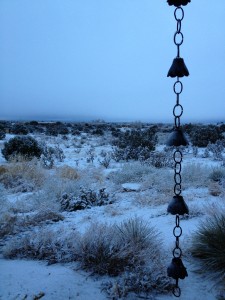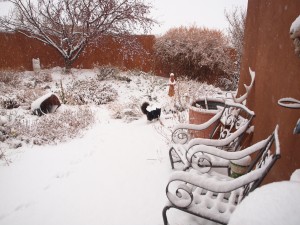 I’m over at Word Whores today, talking about my new secret method for setting annual goals.
I’m over at Word Whores today, talking about my new secret method for setting annual goals.
Category: Blog
Creating the Ideal To-Do List
 My stepsister brought this wine over on Christmas, by way of celebrating my three-book deal. Isn’t it great? Just love it! Thank you, Hope!
My stepsister brought this wine over on Christmas, by way of celebrating my three-book deal. Isn’t it great? Just love it! Thank you, Hope!
You all know how much I love my lists. And spreadsheets. Over the holiday, I was comparing To Do lists with Stepdad Dave, who shares my Virgo inclinations and loves a good To Do list. We discussed the merits of various approaches – the long-term To Do list versus the short-term one. We gave him a Boogie Board a while back – an electronic listmaker – and he complained that, because of the way it erases, that he has to write down important tasks that he won’t do later (like after the holidays) over and over again.
What? This is so interesting!
Plus, there were cookies.
At any rate, I’ve been thinking about my lists and how I have them set up. The long-term vs. short-term thing can be an issue. Especially when a long-term task is something like “write this novel.” Of course, that kind of thing one breaks out into daily word counts, but it’s still on the list, at least mentally. Hovering out there, like a grinning hot air balloon on the horizon. Other long-term tasks are things I’ve been meaning to do – like contacting certain bloggers for reviews, or putting tax information together. No deadline (yet), but needing to get done.
My big problem is that I tend to load too many tasks onto a single day. With an entire day ahead of me, I become flush with ambitious optimism. I truly believe that I will accomplish All The Things. The problem then is that, if I don’t, I get all sad. It doesn’t matter that I finished ten tasks, those two things still lurking on my list, undone, taunt me. Worse, I have to move them to the next day, or back to my long-term list.
What I’m thinking of for the New Year is making a tiered list, one that reflects priorities. I might make a Must Do list, followed by and optional list. I wonder, though, if the stuff on the optional list will *ever* get done, if they’re not prioritized enough…
What – you’re still reading? If so, you might be a listmaker, too. What are your secrets for prioritizing tasks??
On Planning for Life to Continue
 I’m over at the Here Be Magic blog today, celebrating Boxing Day and looking forward to the world continuing to go ’round.
I’m over at the Here Be Magic blog today, celebrating Boxing Day and looking forward to the world continuing to go ’round.
Jeffe’s Five Faves of 2012
 I’m over at Word Whores today, talking up my five favorite books of 2012.
I’m over at Word Whores today, talking up my five favorite books of 2012.
Another Book Deal!
 I know, right? My cup totally runneth over!! The other shoe has finally dropped and it’s a Manolo Blahnik stiletto – maybe those ones with the red soles.
I know, right? My cup totally runneth over!! The other shoe has finally dropped and it’s a Manolo Blahnik stiletto – maybe those ones with the red soles.
Because, as excited as I am about doing the Phantom e-serial – and wow, I can’t believe I announced that exactly two weeks ago, it feels much longer – this is even bigger and better.
Like three-book contract bigger.
Like I get money up front better.
Like PRINT, beyotches!!!
Ha! I may be running around giggling like a madwoman. When my mom asked me if this is what I’d been working toward all these years, I had to say, why, yes. Yes it is. All those Christmases when my family asked me what I wanted for Christmas and I told them “a lucrative multi-book contract” – well Santa finally delivered. (And yes, my family does love me – most of the time – even though I’m a smart ass.)
So, here’s the blurb from Publisher’s Marketplace:
|
December 17, 2012
|
|||||
| Fiction: Sci-Fi/ |
Jeffe Kennedy’s The TWELVE KINGDOMS Series, three books in which the three daughters of a failing kingdom find their own magic and use that to help heal their lands and people while finding love along the way, to Peter Sentfleben at Kensington, in a nice deal, for publication in 2014, by Pam van Hylckama Vlieg at Larsen/Pomada Literary Agents (World).
|
||||
This is the same editor who acquired the Phantom story. He read and loved The Middle Princess, which faithful readers of this blog will likely remember me writing. I’ll be doing some revising on that (though not much, Peter thinks – yay!) and turn that in by May 1. Then book 2 is due 11/1 and book 3 is due 5/1/2014.
Let me tell you, it feels really weird to have a 2014 deadline. “Hey, Jeffe, do you have plans for April, 2104?” “As a matter of fact…”
Please also note that these books will be classified as Fantasy. I am officially a Fantasy Author as well as a romance author. I’m all pleased with myself. Also, the books will be trade paperback (and will be available in digital, too), which is extra fancy. They don’t love my title (alas!), so that will change. We’re just kind of calling the series “The Twelve Kingdoms” for now. Which is probably for the best, because when I get emails from Peter with the subject line “Princesses,” it kind of cracks me up.
Of course, that just fits in with the whole giggling-like-a-madwoman thing.
I am beyond lucky.
What Does “Writer’s Life” Really Mean?
 Dealing with blog post tags is an ongoing part of my life.
Dealing with blog post tags is an ongoing part of my life.
I know, I know – it doesn’t count as an actual problem. Still, the labels I choose to index the various things I’m writing and talking about, provide a certain insight into how I see things at different points in my life.
See, the thing about blog post tags is that I don’t have a good system for assigning them. I’ve tried a few things, but it’s still a semi-random and more-than-a-little subjective. WordPress will suggest labels from my existing ones as I type them into a box, but it’s kind of like looking a word up in the dictionary – you have to have kind of an idea of how to start it before you can get close. It becomes a problem for me, because I sometimes want to look up an old blog post – something I know I wrote about before – and I have to play this guessing game with myself to figure out how I might have tagged it at the time. I’m right less than half the time.
So when I label current posts, I try to strategize what my future self will think of to look it up under. This means I’m playing this eternal guessing game with my past and future selves, which probably does not speak well for my long-term sanity.
I have this fantasy, you see, that I would be incredibly organized and *always* tag the same concept with the same tags. This would make the scientist in me happy.
However, I’ve recently realized part of the problem: concepts for me drift over time. They don’t get the same tags because I don’t think of them in the same way.
I noticed this on Tuesday, when I tagged my post on How Having Your Book Rejected Makes You a Better Person with the label “Writer’s Life.” Because that is absolutely a topic that is core to living the life of a writer to me. I talked about how my friend is dealing with disappointment in her writing career and compared it to recovering from heartbreak and becoming a stronger person because of it. Yes, “Writer’s Life” is the perfect tag for that.
It struck me then that this not how I used to think of “Writer’s Life.” I started writing in a more academic and literary environment and discussions about “writer’s life” were much more about art and philosophy and mindfulness. A lot of it can be encapsulated by the critical praise for Annie Dillard’s “The Writing Life.” (Yes, I have that book on my shelf.)
A kind of spiritual Strunk & White, a small and brilliant guidebook to the landscape of a writer’s task.
…a glimpse into the trials and satisfactions of a life spent with words.
Gracefully and simply told, these little stories illuminate the writing life…
Anyone hoping to see inside the process of literary artistry is unlikely to find a more lucid, sensitive or poetic view.
…as slim and potent as the Tao Te Ching, that ancient Chinese manual on the art of living…
And so on.
This is how I used to view this concept – probably heavily informed by this book. I look back to when I began my blogging life over at lovepowerandfairytaleendings.blogspot.com, where I used the “Writers Life” tag 102 times in the two-year, eight-month life of that blog, making it my most frequently used tag. I look back at those early posts and see I did a lot of angsting over things like selling out and balancing writing projects and order vs. chaos (I linked to it because that one is kind of amusing).
At any rate – I can see how I’ve changed in my understanding of the Writer’s Life. I moved from thinking about my writing process to recognizing how my day job had made me a better writer and what the corporate environment had taught me about dealing with personnel issues.
I think this is a natural progression: as we become professional writers, our lives become less about the philosophy and more about the reality.
And that’s a good thing.
Now to select some tags for this besides “Writers Life.”
How Having Your Book Rejected Makes You a Better Person
 Our first snow fell on Sunday – also Jackson’s first-ever snow. He lasted about two minutes before dashing back inside to furiously clean between his toes.
Our first snow fell on Sunday – also Jackson’s first-ever snow. He lasted about two minutes before dashing back inside to furiously clean between his toes.
When I was in my early twenties, I used to argue that everyone needed to have their heart broken at least once. Not only was this a great way to soothe a friend who’d just had his or her heart broken – hey! this will make you a stronger person! – but I also believe it to be very true.
Falling in love is a fabulous, giddy and wonderful thing. Loving relationships are what sustain us through life. Most of us want to find that special someone (or someones) and find our own happily ever after. But that quest can be a trial. With each busted relationship, we lose not only that person, but also the dream of what could have been.
I’ve been there – the sense of failure, the certainty that I would never love again and would be alone for the rest of my life.
Simply awful.
But, over time, your heart begins to heal and you discover that you learned some things. Thinking about a new relationship changes – it’s no longer a laundry list of “wants.” After a shattering break-up, you get a a really good idea of what you do NOT want. The new Dealbreakers List is usually short, but it’s backed by experience. It provides you with a much better compass for knowing what is likely to work for you.
Heartbreak also teaches the very valuable lesson that nothing is easy. Even if the falling in love part was, the maintaining of it can be damn hard work. If you take the relationship for granted, fail to nourish it, it can fall apart in the blink of an eye.
Finally, that rejection, the sense of failure – from those things grows resolve to do better. To be better. Hope grounded on this kind of foundation is a powerful force.
Then, when you love again – you’re better at it. Wiser. More careful with what you’ve been handed.
I think career-heartbreak can be just like this.
A friend of mine recently had her option book rejected. In most contracts with publishers, they say they’ll publish two or three books in a series and then have right of first refusal to see the next book in the series. This means you have to show it to them first, before you try to sell it to someone else. The rub, however, is that very few publishers want to buy the third or fourth book in a series. To them the series has been done already. So, when her option book was refused, she knows that’s the end of those characters and that world.
(And yes – she can self-publish more books in the series, and she might, but that’s a different kind of effort.)
This kind of thing happens All The Time. Of my three crit partners, all three have had their option books refused after the first two in a series. They grieved, wailed and gnashed their teeth – and moved on.
While I see my friend going through the stages of grief over this, I also see her wrestling with the heartbreak and healing from it. She now knows what she does not want in a new publisher, a new book contract. She was lucky to begin with – a Cinderella story of many offers and a very nice deal. The courtship was great but working under contract was crushing. She knows now what she needs to maintain a creative and productive writing pattern.
Best of all, when we discuss her options – like self-publishing – she shows an increased resolve. She’s working on a new story and she’s going to focus on that. She’s stronger and wiser now.
It’s funny to me, that in my 20s the conversations were about busted relationships and now, in my 40s, they’re about busted careers.
We know now what we learned then – there’s always another one, just around the corner.
Using the Holidays as a Plot Device – from Perky to Perfect
 I’m over at Word Whores this morning, talking about the bad and good of holiday-themed stories.
I’m over at Word Whores this morning, talking about the bad and good of holiday-themed stories.
What RWA Has Done for Me Lately
 Dramatic sunset last night. And I got more happy news yesterday, which I should be able to share next week. Hopefully the world won’t end in two weeks, because I have plans.
Dramatic sunset last night. And I got more happy news yesterday, which I should be able to share next week. Hopefully the world won’t end in two weeks, because I have plans.
There’s been some bruhaha over in the hallowed halls of RWA lately. One of the special interest chapters, Women’s Fiction, is being disbanded because their mission and bylaws don’t match RWA’s. RWA, being the Romance Writers of America, has the mission of furthering the romance genre. The Women’s Fiction chapter deliberately focused on fiction for women that are not romances. The chapter bylaws were apparently quite clear on this and some members were even asked to leave (with no acrimony, dues refunded) because their work did not meet the Women’s Fiction definition. All of this has come into play because of increased IRS scrutiny of non-profit tax-exempt organizations. Organizations with this status cannot have subsidiaries with bylaws that are in conflict with the umbrella organization.
All very dry and not really what I want to talk about today.
Amidst all the debate – and there’s been a fair amount of lively and mostly polite debate on the forums and email loops – one person said that RWA had never done one thing to advance her career. A couple of people called her on it, but I’d like to take it a step further.
I am a believer in professional organizations. The strength in numbers created by people of like minds can have a massive impact on the world, creating a smooth path that newcomers sometimes never appreciate.
I think of this with the women’s movement. So many young women refuse to identify themselves as feminists. That’s because we have the enormous luxury of not needing to. We can vote, hold office, walk about unescorted, obtain any job we wish, control our own money, cannot be owned or traded like property. All important qualities for being an independent human being – and all things that women did not use to have, and that many women around the world today do not have. It’s only a non-issue for the women enjoying the rights the women before us fought for.
Unions are a huge topic of conversation today. The impact of unions on our economy, creating in many cases unsustainable – even ridiculous – organizational and fiscal scenarios. But we can’t forget how unionization changed the face of our world following the industrial revolution. We take for granted our five-day work week, 8- or 9-hour days with breaks to eat, as if these are basic rights. Of course little kids go to school and can’t work in factories. But all of these “basic rights” are only there for us to take for granted because our predecessors banded into unions and fought for it.
Now, comparing a professional organization for writers of romance looks a bit weak in the face of these profound battles, but the principle is there. For a romance writer – and member of RWA – to say the organization has never done one thing for her only demonstrates that we have no idea what we’d be facing if RWA had never existed.
There’s a reason that the RWA president has to have published at least five books (I think that’s the right number), because our president must be experienced in the industry, with a credible level of clout for dealing with publishers and literary agencies. What if romance writers never had that public face to represent us?
We all know that romance has long been the sneered-upon bastard stepchild of the reading world – despite its tremendous sales. What kind of conversations would we be having about romance without those sales numbers that RWA compiles and shouts to the world?
For myself, I can vouch that RWA has opened more doors for me and provided the greatest community than any other writers organization I’ve been part of. And I’ve been in quite a few – from arts councils to small critique groups. The conferences, local chapters, online chapters and other communities in RWA have given me an array of tools and friendships that I could never attempt to quantify.
More, I feel certain that those writers who banded together back in 1981 created a smooth road for me. There are all sorts of things I take for granted that might not be there without our powerful and respected professional organization.
I’m proud and grateful to be a member.
New Book Deal!
 This is that same sunrise, which has turned out to be a fabulous omen.
This is that same sunrise, which has turned out to be a fabulous omen.
I’m excited, thrilled and delighted to announce that the fabulous Agent Pam has sold a project to Kensington Books for me!!
Here’s the blurb from Publisher’s Marketplace:
Digital: Fiction: Women’s/Romance
Jeffe Kennedy’s MASTER OF THE MASKS, an update on the Phantom of the Opera set in Santa Fe with BDSM, to Peter Senftleben at eKensington, in a three-book deal, for publication in 2013, by Pam van Hylckama Vlieg at Larsen/Pomada Literary Agents (World).
The title will likely change, but it will be a very fun and sexy update of the Phantom legend. The story will be told in six installments and will launch Kensington’s e-serial line. (The very witty Carolyn Crane thinks I should ask for a t-shirt in my contract that says “Flagship Author.”)
I talked to Peter on the phone yesterday while we thrashed out details and ideas. I think he’s going to be great to work with – he also loves spreadsheets and New Orleans. (He went to Tulane, Mom!)
So, I’m just all giddy and excited and I’m probably forgetting to tell you half of it! Ask me questions!